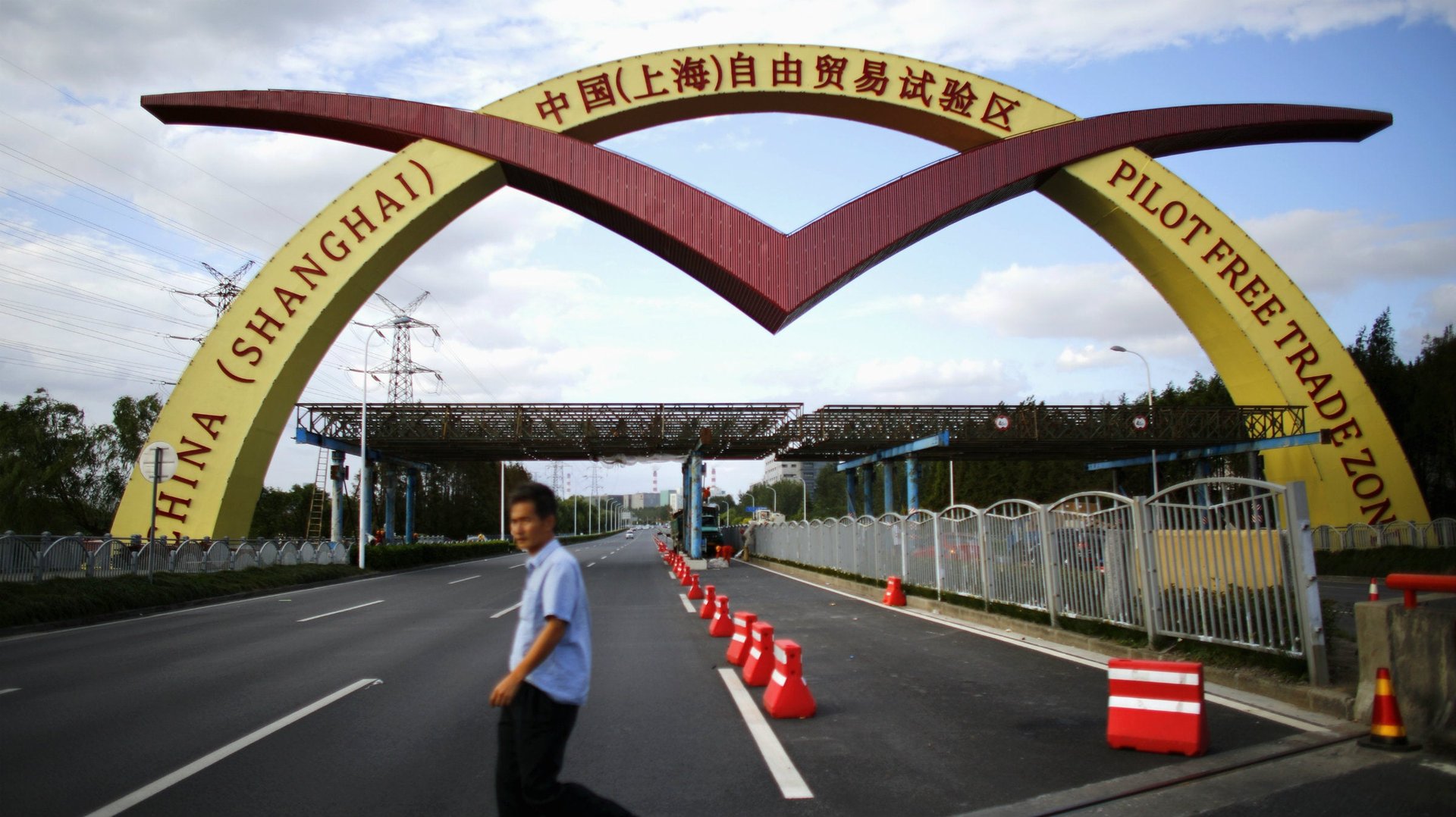The updated knowns and unknowns of Shanghai’s soon-to-launch Free Trade Zone
Shanghai’s much-hyped free trade zone will officially open on Sept. 29. Nearby home prices have already surged 30% and stock prices of logistics and shipping firms are climbing, not to mention any publicly traded firms that happen to have “Shanghai” in their names.


Shanghai’s much-hyped free trade zone will officially open on Sept. 29. Nearby home prices have already surged 30% and stock prices of logistics and shipping firms are climbing, not to mention any publicly traded firms that happen to have “Shanghai” in their names.
The 29 square kilometer (11 square mile) plot, part of Shanghai’s coastal Pudong New Area, includes a duty-free area, a port, an airport and a logistics area. According to the Ministry of Commerce it will represent a significant “upgrade” of China’s economy. What does that actually mean?
At the very least the zone will have lower tariffs and other trade incentives—but that’s true of numerous free trade zones already present in mainland China. What has people really excited is the prospect of using Shanghai as a testbed for economic liberalization that China’s leaders have already acknowledged are needed: letting the market set interest rates, allowing foreign firms to freely trade the yuan, and letting outside investors put money into state sectors that have long been off limits.
Details on these more ambitious policies have been noticeably lacking, although the State Council cleared up some questions today with a statement on its website (link in Chinese) and a detailed appendix that explains how some industries could work within the zone.
We won’t have any more additional information until 32 rules relating to the zone are made available on Sept. 29, with 20 more to follow before the end of the year. But in the meantime, to borrow the approach of former US defense secretary Donald Rumsfeld, here’s a Quartz cheat sheet on the known knowns, the known unknowns and the unknown unknowns of the Zone. Please annotate with more information if you have it.
Definitely happening
Free trade policies. The flashy new government website for the region (link in Chinese) shows Shanghai as a global trade hub, and an English-language site lists “international trade” and “modern logistics” as the basic functions of the zone.
Customs duties and import taxes will be waived on goods transferring between the zone and overseas destinations, and income and revenues in “international shipping, transporting, warehouse, and international shipping insurance” are tax-exempt for companies registered in the zone. There are more trade incentives here, including smoother quarantine and customs processes.
Banks, banking and bankers: Foreign banks can operate in the zone without a Chinese partner, if they meet certain requirements. They can also “cooperate” with private investors in China. Chinese banks can conduct offshore business in the zone.
Travel agencies are welcome. Foreign travel agencies can form joint ventures with Chinese partners in the zone—the first time that’s been possible in mainland China—and offer overseas travel to Chinese customers to any destination but Taiwan. Friday’s statement doesn’t elaborate on how these partnerships should be structured.
So are engineering firms, law firms, architecture firms and entertainment companies. There will be fewer restrictions for foreign engineering companies, and the zone will “explore cooperation” between Chinese law firms and foreign law firms. Architecture firms can be 100% foreign-owned in the zone, and projects within the zone built by foreign and Chinese companies together will have less restrictions. Entertainment companies can also be 100% foreign owned within the zone.
Don’t forget the bars. Foreign “entertainment venues” in the zone can be completely foreign-owned, today’s statement says. It goes on to define these venues as “pubs.”
Potentially happening
Those long-hoped-for financial reforms. The zone will make use of market-based interest rates and yuan convertibility on the capital account “as conditions allow,” today’s statement said, according to an interpretation by the Wall Street Journal. The zone is expected to pioneer China’s attempts to promote “interest-rate liberalisation plus, eventually, renminbi convertibility,” HSBC analysts predicted this summer. “It will also encourage financial product innovations.”
More investment opportunities: The zone will take a “negative list” approach to investing, which means that foreign investors can invest in all industries except those specifically named by the government. So far, though, that list has not been released. One draft plan viewed by Bloomberg mentions banking, health insurance and shipping as industries that will be “liberalized.”
A less restrictive approach could represent a “demonstration of decentralization of power by the government,” analysts from JP Morgan Chase wrote in a recent note to clients, adding that the zone may also allow Chinese companies to make foreign investments without seeking approval from central government ministers.
Commodities trading: The government will “gradually allow foreign enterprises to participate in commodity futures trading,” according to reports by Shanghai’s East Day news site (in Chinese) and the South China Morning Post. China consumes 40% of the world’s metals and is expected to surpass the US in oil demand in four years, but the country’s domestic commodity trading market is in its early stages. Chinese banks are prohibited from trading commodities, except gold. The SCMP also said Beijing would grant permission for “foreign commodities exchanges to set up their own futures delivery warehouses.”
More open internet access. After the South China Morning Post reported that China would lift its blockade on Facebook, Twitter and The New York Times, the state-run Global Times seemed to agree in an English-language editorial on Sept. 25, which declared “possible that Internet access will enjoy more openness within the zone.” But on Sept. 26, state-sponsored newspaper People’s Daily said unequivocally internet access would be consistent with the rest of the country.
Today’s State Council statement seems adds to the confusion—foreign companies may be allowed to offer “specialized telecommunications services” within the zone, on the condition they protect “internet information security.” Companies could be granted permission to offer services that break existing Chinese laws on a case-by-case basis.
Jennifer Chiu contributed reporting.